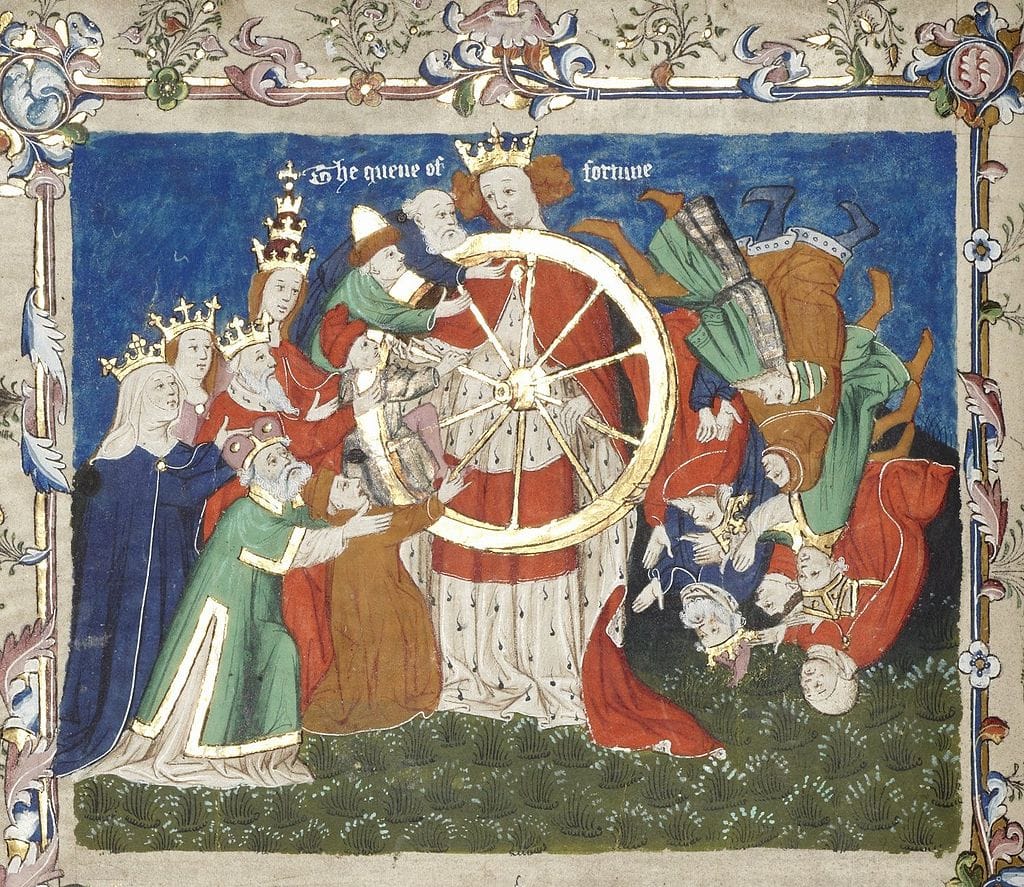In his Nicomachean Ethics, Aristotle raises a difficult but salient question: Can we consider someone truly happy when we don’t yet know how their life will end?
Take the example of the mythical king, Priam.
Priam had it all: wealth, status, power, and over fifty sons and daughters. Then the Trojan War happened and everything went to hell in a handbasket. In his old age, Priam not only lost all his material possessions but most of his children were either killed or enslaved. Finally, the old king himself was clubbed to death at the altar of Zeus in a failed attempt to seek asylum.
It doesn’t matter that Priam wasn’t a real person. We’ve all known – or known of– someone who lives in relative peace and comfort and then one day wakes up to the unimaginable.
I’m not referring to the “usual” unpleasant things that can happen like losing your job or having your car totaled. I speak here of rarer but still plausible things: being diagnosed with an irreversible disease that destroys your nerves and leaves you trapped inside your own body, for example. Or all of your children dying in a car crash at once. The type of thing to which no feeling person would dare say, “Oh, but I’m sure there’s a bright side here somewhere.”
Can a person who experiences this sort of tragedy still be happy? Or are these deal-breakers and horrible rogue outliers that put us in a separate category from “normal” people?

Aristotle himself didn’t find this an easy question to answer.
On the one hand, he says, it makes sense that at least a part of our happiness depends on the things outside our control. However, this is a slippery slope down a dark road to fatalism and despair. “To entrust the greatest and noblest thing to chance would be excessively discordant,” he concludes (I imagine him shaking his head and shuddering a little when he says this). 1
So yes, at least according to Aristotle, we can be happy even when things go hideously wrong. It might require our happiness to take on a different, mellower flavor but our mental well-being is not entirely beyond our control.
That’s a hopeful first step; now comes the question, “how do we do that?” We also must ask, “how much of our happiness has to do with luck in the first place?”
To answer both we must first understand how reality works.
We Live In a World of Black Swans
The ancient Roman poet Juvenal used the metaphor of a “rare bird, very like a black swan” to refer to something that seems impossible or imaginary. No one in ancient Rome (or Asia or Africa, as far as we know) had ever seen a black swan, so the idea of one existing sounded about as absurd as the idea of a leopard with stripes.
Then in the 17th century, Dutch explorers who visited Australia were greeted by a surprise: the sight of an actual, flesh-and-blood black swan. Of course, the people of Australia knew that black swans existed, but since the rest of the world didn’t, it was quite a shock. 2
A black swan is something that does not exist, until it does. And when it does, it changes everything.
The author and probability expert Nassim Taleb uses the phrase “Black Swan” to describe the sudden and dramatic appearance of something unprecedented in the market or world events. The term has since become broad and popular in usage. 3
Put simply, a black swan is something that does not exist, until it does. And when it does, it changes everything.
Like a car accident that leaves you paralyzed. Or the announcement that your child has bone cancer. Or the discovery that your partner is attracted to the same sex and no longer wants to be with you (or the reverse of this). 4
We are aware that these things do exist “out there” and that they happen to other people, but in an instinctive act of self-protection we assume they won’t happen to us. To be fair, they don’t exist for us. Until they do. Unless they do.
Our human brains are not biologically equipped to be tranquil and peaceful when “the unimaginable” strikes. It doesn’t make sense to waste time or energy worrying that something terrible could happen when it most likely won’t. As a result, we don’t deal well with sudden change.
However, knowing that black swans exist and acknowledging their reality helps us adapt when and if they do come. The Stoics practically specialized in this kind of thinking. “No man is crushed by misfortune unless he has first been deceived by prosperity,” Seneca notes.
Knowing you aren’t special or immune is the first step.
Belief in Luck Versus “Personal Luckiness”
An interesting study on people’s beliefs about luck found this distinction: people who believed that luck played a greater role in their lives tended to be more unhappy and negative, while those who believed in “personal luckiness” tended to be happier. 5
What’s the difference?

People who believe in personal luckiness don’t necessarily believe that their fate depends on luck or external events, but rather they see themselves as “lucky.” It’s all about perspective, in other words (my conclusion, by the way, not the study’s). You could reside in a manicured home on a lakefront property and still be unhappy because you live in fear of bad luck striking at any moment, or you could live in a mobile home and feel like you’re very lucky because you’re focused on all the good things that you have.
Philosophy professor Kevin Mulligan cautions against a foolish belief in being lucky, however:
Insofar as one prefers that one be lucky in life rather than unfortunate one is tempted to form incorrect beliefs about one’s situation, life, relations and capacities, about matters well beyond one’s control. For such beliefs are constituents of felt or subjective happiness. The illusion that one is lucky in life, that Fortuna is on one’s side, is one of the worst illusions, one of the worst things for a person, just because being lucky in life is the highest form which positive personal value, being good for a person, can take. 6
It’s one thing to believe that we’re lucky simply because we’re grateful and focused on the good things we have. It’s another to believe that we’re lucky because we’re favored by fate or destiny, with no need to work on self-improvement.
Anyone who takes this second view risks (their worldview) getting crushed by a wrecking ball as soon as the unexpected strikes.
Being Grateful “Outside-the-Box”
Black swans and luck are out of our control; how else do we cope besides accepting their reality?
Perspective is probably the most powerful tool in our arsenal. Perspective – in the form of gratitude – is the closest thing we have in life to a vaccine against the worst effects of tragedy, and not enough of us bother to get inoculated.
What I’m referring to is something broader and deeper: a mind that’s trained to see the wonder in everything, to stay active and curious, to not let the tiny details of life escape our notice. A mind that is grateful not just for what happens, but for what doesn’t happen. A mind that asks, What can I do about it? For Aristotle, it means a life of contemplation.
Being grateful, being proactive, and choosing to believe in “personal luckiness” will not only foster our happiness now but will help us weather the storm when the black swan rears its head.
There is no way of knowing what kind of a black swan it will be, when it will happen, or even if it will happen; but our worldview and life skills can help us, God willing, get through it with more hope and dignity than we could otherwise.
Don’t wait for the black swan to show up. Work on your happiness now.
***
Read Next: Why We Can’t Predict What Will Make Us Happy →
Footnotes
- Aristotle. Nicomachean Ethics. Translated by Robert C. Bartlett and Susan D. Collins. University of Chicago Press, 2012.
- Interestingly, only black swans are native to Australia, not white ones. So it’s possible that white swans were as mythical to the native people of Australia as black swans were to the rest of the world.
- I’m not sure how Taleb feels about this.
- I want to emphasize: there is no objective way to measure a black swan. People who have become quadriplegics have since said that it was “the best thing to ever happen” to them. Others who go through more “common” difficulties like a sudden divorce are totally crushed by their experience. Black swans vary.
- Thompson, E. R., Prendergast, G. P., & Dericks, G. H. (2019). Do the happy-go-lucky? Current Psychology. https://doi.org/10.1007/s12144-019-00554-w
- Mulligan, K. (2016). Happiness, Luck, and Satisfaction. Argumenta, (02), May 2016.
